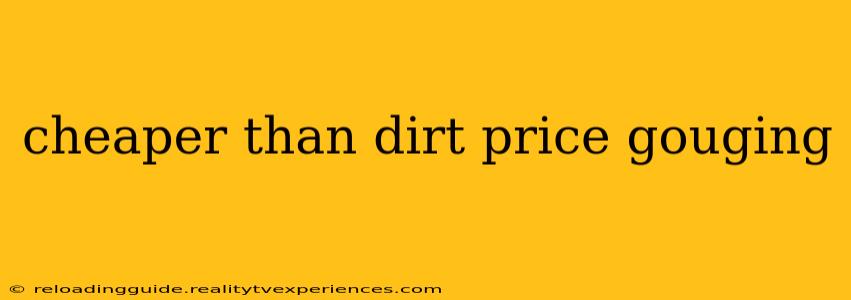The online retailer Cheaper Than Dirt has faced accusations of price gouging, particularly during times of high demand for firearms and ammunition. This article delves into these allegations, exploring the dynamics of pricing in a competitive market, the legal definition of price gouging, and how consumers can protect themselves from exploitative pricing practices.
Understanding Price Gouging
Price gouging generally refers to the act of raising prices significantly above the usual level, especially during emergencies or periods of high demand when supply is constrained. While there isn't a universally agreed-upon percentage increase that constitutes price gouging, it typically involves charging prices that are considered excessive and unfair, taking advantage of consumers' vulnerability. Determining whether a price increase constitutes price gouging is complex and often depends on several factors including:
- Market conditions: Are there genuine supply chain issues justifying higher prices? Or is the price hike purely opportunistic?
- Historical pricing: What has the retailer's pricing been historically for the same product? A drastic and sudden increase may raise red flags.
- Competitor pricing: Are other retailers selling similar products at comparable prices? Significant deviations can be indicative of price gouging.
- Consumer demand: Is the increased demand genuine and driven by legitimate factors (e.g., a natural disaster), or is it artificially inflated?
Cheaper Than Dirt's Pricing Practices Under Scrutiny
Cheaper Than Dirt, a large online retailer of firearms, ammunition, and related accessories, has faced criticism over its pricing strategies, with some consumers alleging price gouging. These allegations often surface during periods of heightened demand, such as following mass shootings or during periods of political uncertainty. The company's pricing decisions have prompted debate among consumers, with some arguing that market forces justify higher prices during periods of scarcity, while others contend that Cheaper Than Dirt is exploiting a vulnerable market.
Analyzing the Arguments
Proponents of Cheaper Than Dirt's pricing argue that the company merely reflects market dynamics. They contend that increased demand combined with limited supply naturally drives prices upward. Furthermore, they argue that the company incurs significant costs in warehousing, shipping, and maintaining inventory, which are passed onto consumers.
Critics, however, argue that Cheaper Than Dirt engages in opportunistic price increases, exploiting consumer anxieties and fears. They contend that the company manipulates pricing to maximize profits at the expense of consumers' well-being, particularly in situations where individuals feel a strong need to acquire firearms or ammunition quickly.
Consumer Protection and Legal Recourse
Several states have laws against price gouging, usually triggered during emergencies or states of disaster. These laws often set specific percentage limits on price increases beyond the normal market rate. However, the interpretation and enforcement of these laws can vary, making it challenging to pursue legal action against alleged price gouging.
Consumers can take the following steps to protect themselves:
- Shop around: Compare prices from multiple retailers before making a purchase.
- Monitor prices: Keep track of historical pricing to identify unusually high increases.
- Report suspicious activity: Contact your state's attorney general's office or consumer protection agency if you suspect price gouging.
- Consider alternatives: Explore alternative sources for necessary goods, such as local gun shops or online marketplaces.
Conclusion: Navigating the Market
The debate surrounding Cheaper Than Dirt's pricing practices highlights the complexities of market dynamics, consumer protection, and the ethics of profit-maximization in sensitive markets. While market forces can influence pricing, it's crucial for consumers to remain vigilant against potentially exploitative practices and to utilize available resources to protect themselves. Transparency in pricing and responsible business practices are essential to fostering trust and ensuring fair treatment for all consumers. Further investigation and regulatory oversight may be necessary to address the ongoing concerns surrounding price gouging in the firearms and ammunition industry.

